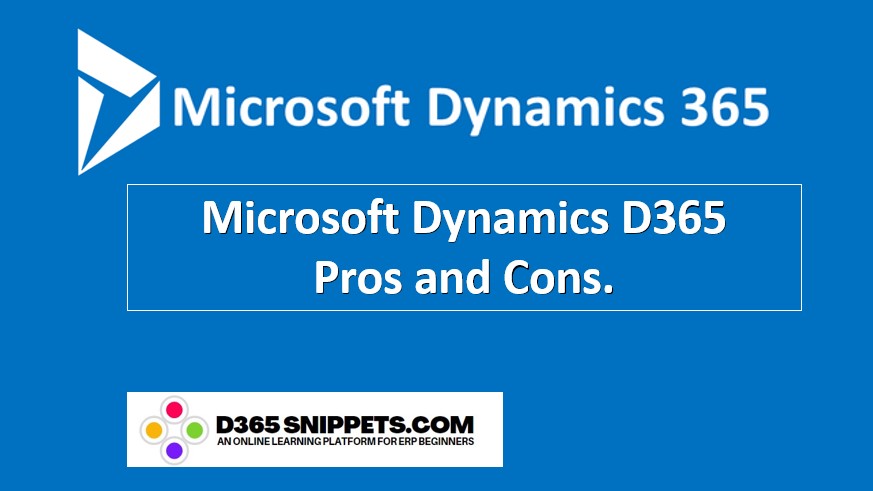Dynamics 365 is a cloud-based software suite offered by Microsoft that provides a range of business applications including ERP, CRM, and other productivity tools.
Here are some of the pros and cons of Dynamics 365:
Pros:
Integrated suite of applications: Dynamics 365 provides a comprehensive suite of applications that can be seamlessly integrated with each other, providing users with a unified experience and a holistic view of their business processes.
Scalability: The platform can easily scale to accommodate the changing needs of a growing business. Users can choose to add or remove applications and users as needed, without requiring additional hardware or infrastructure.
Cloud-based: Dynamics 365 is a cloud-based platform, which means that users can access it from anywhere, at any time, using any device with an internet connection. This flexibility allows users to work remotely, collaborate with their teams, and access real-time data.
Artificial Intelligence (AI): Dynamics 365 comes equipped with AI and machine learning capabilities, allowing users to automate routine tasks, gain insights from data, and improve decision-making.
Integration with Microsoft products: Dynamics 365 integrates seamlessly with other Microsoft products such as Office 365, Power BI, and Azure, making it easier for users to access data and collaborate across different platforms.
Cons:
Cost: Dynamics 365 can be expensive, especially for small businesses that require multiple applications and users. However, the platform offers different pricing options, and users can choose the applications they need, which can help reduce costs.
Complexity: Dynamics 365 is a complex platform that requires a certain level of technical expertise to configure and customize. This can make it challenging for small businesses that do not have dedicated IT teams.
Limited customization: Although Dynamics 365 offers some customization options, they may be limited compared to other platforms, and businesses may need to rely on third-party developers to create custom solutions.
Migration: Migrating from legacy systems to Dynamics 365 can be time-consuming and complex. Businesses need to ensure that they have a solid plan in place to avoid disruptions to their operations.
Data security: As with any cloud-based platform, there may be concerns around data security and privacy. However, Dynamics 365 offers robust security features and compliance certifications to help address these concerns.
In conclusion, Dynamics 365 is a comprehensive cloud-based software suite offered by Microsoft that provides businesses with a range of applications, including ERP, CRM, and productivity tools. Its integrated suite of applications, scalability, cloud-based nature, AI and machine learning capabilities, and integration with other Microsoft products are some of its key strengths. However, it may be expensive, complex, and may have limited customization options. Businesses may also face challenges when migrating from legacy systems, and there may be concerns about data security and privacy. Nonetheless, Dynamics 365 can be a powerful tool for businesses looking to streamline their operations, automate routine tasks, gain insights from data, and improve decision-making.
Keywords
Microsoft dynamics pros and cons.
Microsoft Dynamics 365 pros and cons.
Microsoft dynamics advantages and disadvantages.
disadvantages of Microsoft dynamics 365.
pros and cons of Microsoft dynamics.
Microsoft Dynamics CRM pros and cons.
pros and cons of Microsoft dynamics 365.







No comments:
Post a Comment